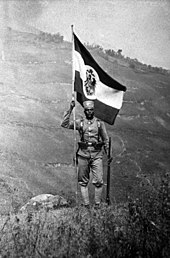German colonial empire | |
|---|---|
| 1884–1920 | |
 German colonies and protectorates in 1914 | |
| Status | Colonial empire |
| Capital | Berlin |
| Common languages |
|
| History | |
| 1884 | |
| 1888 | |
| 1890 | |
| 1899 | |
| 1904 | |
| 1905 | |
| 1919 | |
• Disestablished | 1920 |
| Area | |
| 1912 | 2,953,161[1] km2 (1,140,222 sq mi) |
| Population | |
• 1912 | 11,979,000[1] |

The German colonial empire (German: Deutsches Kolonialreich) constituted the overseas colonies, dependencies, and territories of the German Empire. Unified in 1871, the chancellor of this time period was Otto von Bismarck. Short-lived attempts at colonization by individual German states had occurred in preceding centuries, but Bismarck resisted pressure to construct a colonial empire until the Scramble for Africa in 1884. Claiming much of the remaining uncolonized areas of Africa, Germany built the third-largest colonial empire at the time, after the British and French.[2] The German colonial empire encompassed parts of several African countries, including parts of present-day Burundi, Rwanda, Tanzania, Namibia, Cameroon, Gabon, Congo, Central African Republic, Chad, Nigeria, Togo, Ghana, as well as northeastern New Guinea, Samoa and numerous Micronesian islands.
Germany lost control of most of its colonial empire at the beginning of the First World War in 1914, but some German forces held out in German East Africa until the end of the war. After the German defeat in World War I, Germany's colonial empire was officially confiscated as part of the Treaty of Versailles between the Allies and German Weimar Republic. Each colony became a League of Nations mandate under the administration, although not sovereignty, of one of the Allied powers.[3] Talk of regaining the last Kaiser's lost colonies persisted in Germany until 1943, but never became an official goal of the German government.
- ^ a b Cite error: The named reference
Statistische Angaben zu den deutschen Kolonienwas invoked but never defined (see the help page). - ^ Diese deutschen Wörter kennt man noch in der Südsee, von Matthias Heine Archived 19 October 2017 at the Wayback Machine "Einst hatten die Deutschen das drittgrößte Kolonialreich[...]"
- ^ Biskup, Thomas; Kohlrausch, Martin. "Germany 2: Colonial Empire". Credo Online. Credo Reference. Archived from the original on 14 December 2019. Retrieved 21 April 2019.

